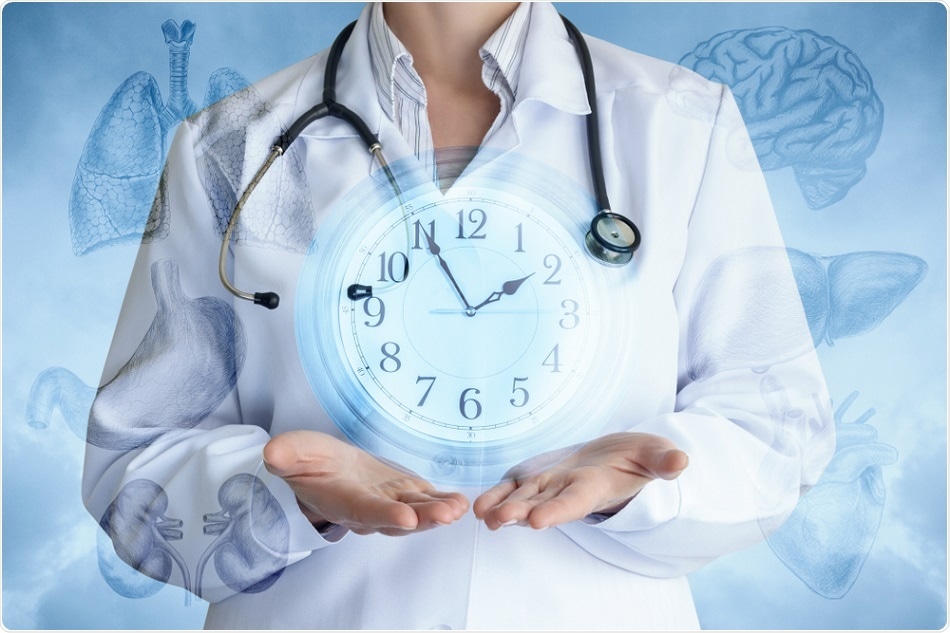The internal biological clock, or circadian clock, which keeps all the bodily functions running smoothly and in perfect timing, is wired to respond positively to a little stress, according to a new study recently published in the journal Neuron. The circadian clock is thought to be situated in the brain, but receives feedback from almost all parts of the body via hormones or nerve impulses arriving via blood and various neural pathways.
 Natali_ Mis / Shutterstock
Natali_ Mis / Shutterstock
Cells in the body talk to each other all the time, communicating signals of danger, stress, breakdown, infection, inflammation, or need for nutrients. Cellular molecules called cytokines are deeply involved in the way these signals are sent and received by communicating cells, as well as how cells respond to such feedback.
In the present study done on mice, the researchers studied the integrated stress response (ISR). This is the body’s response to a variety of stressful stimuli. This type of versatile reaction is necessary to keep neuronal cells functioning smoothly under provocation by multiple and diverse types of challenges posed by short-term changes in their microenvironment. The current study is unique in that it found that the ISR is essential to stimulate the circadian clock to keep running at an optimal speed.
How stress works on the clock
Within the body, the stress communication pathway is activated by a cascade of signals which depends on a protein called eIF2α, the leader or initiator of the team of enzymes involved in protein synthesis within the cell of higher organisms. When the organism is subjected to a mildly stressful situation, this protein undergoes a change called rhythmic phosphorylation within the cells in the brain region called the suprachiasmatic nucleus, which is widely thought to house the origin of the circadian rhythms.
An enzyme called GCN2 adds a phosphate group to the eIF2α at regular intervals. The greater the phosphorylation, the higher the rate at which another protein called ATF4 is produced. This leads to the activation of the Per2 gene, one of the clock genes. The binding of ATF4 to the Per2 gene increases the production of the Per2 protein, and this increases the speed at which the circadian clock ticks. This type of stimulation makes it run better over the long term, with less wear and tear due to daily fluctuations in body function and health. In other words, the circadian period actually becomes shorter in both fibroblast cells, typical of general body cells, and in the mice itself. Low levels of eIF2α phosphorylation, on the other hand, reduces the rhythmicity of the circadian clock and makes the physiological ‘day’ longer. Thus stress signals actually increase the speed and durability of the bodily clock.
Why the study helps
The study is important in that it answers the question as to how stress (as in disease) is related to the breakdown or otherwise of circadian rhythms. If slight stress tones the clock, intense stress could make these responses run amok, disrupting the clock mechanism completely. Compare this to the way the heart responds to stress: a little stress, as with aerobic or cardiovascular fitness exercise, makes it work faster and beat more strongly. This results in an improvement in overall health and wellbeing. However, when presented with too intense or prolonged stimulation, the heart rhythms can go wild, leading to cardiac failure.
The researchers hope to study the molecular-level dialogue between the clock and the cellular stress pathways in more depth and also how different parts of this network give feedback to the circadian clock mechanism.
Hopefully our work can lead to discovering medicine that can manage the stress level and regulate the clock function in disease to keep people healthier.”
Researcher Ruifeng Cao
The study was published on September 12, 2019, and involved seven laboratories spread over the USA and Canada.
Journal reference:
The eIF2α kinase GCN2 modulates period and rhythmicity of the circadian clock by translational control of Atf4. Salil Saurav Pathak, Dong Liu, Tianbao Li, Nuria de Zavalia, Lei Zhu, Jin Li, Ramanujam Karthikeyan, Tommy Alain, Andrew C. Liu, Kai-Florian Storch, Randal J. Kaufman, Victor X. Jin, Shimon Amir, Nahum Sonenberg, & Ruifeng Cao. Nature. https://doi.org/10.1016/j.neuron.2019.08.007.